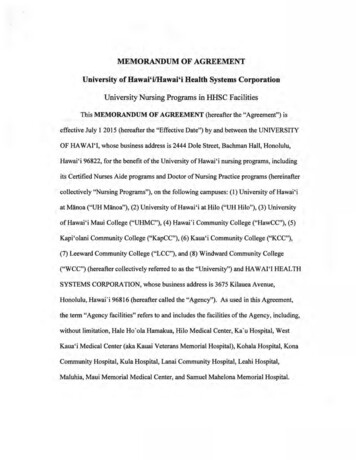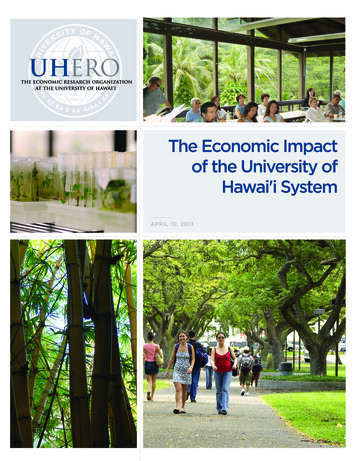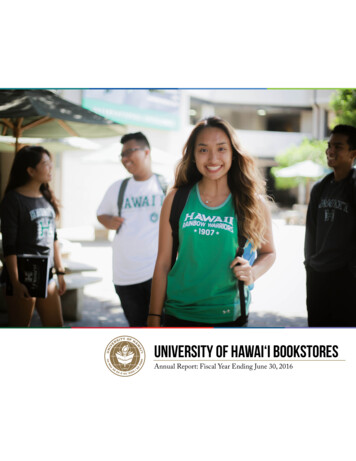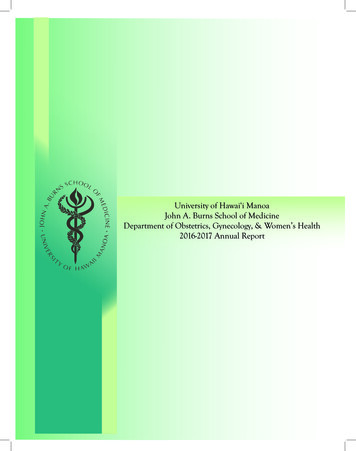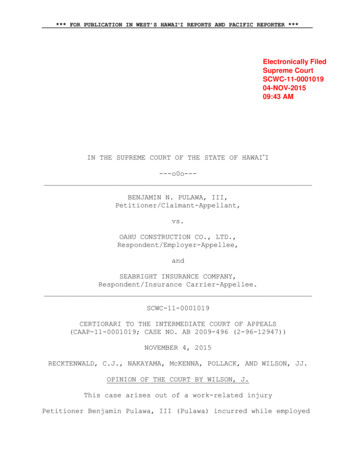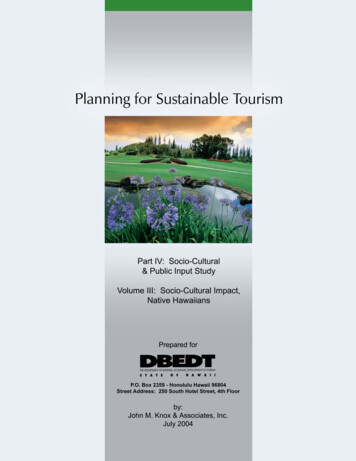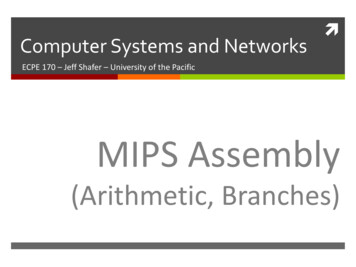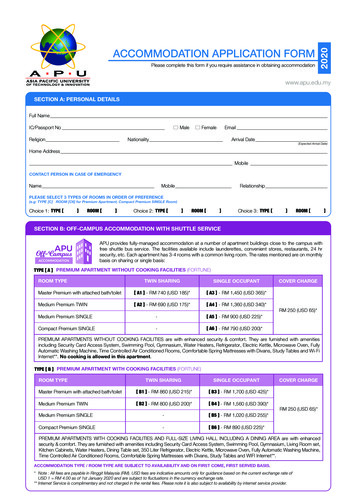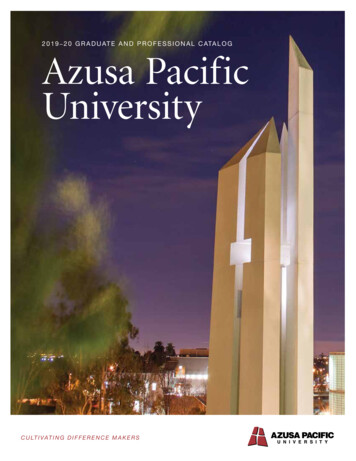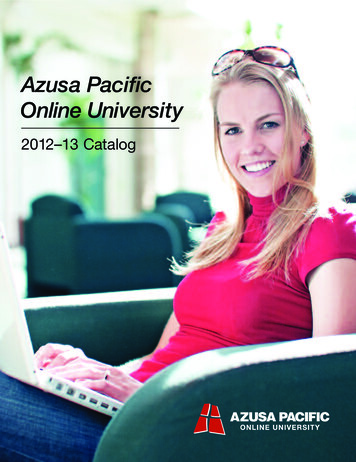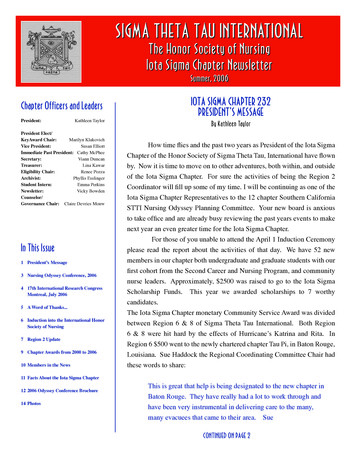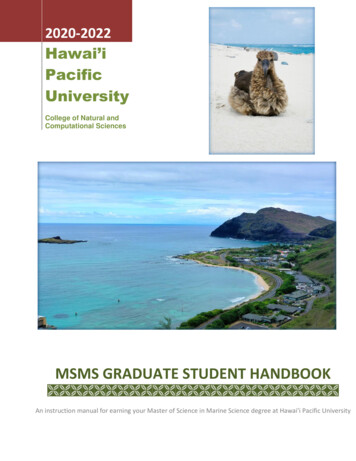
Transcription
2020-2022Hawai’iPacificUniversityCollege of Natural andComputational SciencesMSMS GRADUATE STUDENT HANDBOOK An instruction manual for earning your Master of Science in Marine Science degree at Hawai’i Pacific University
ContentsDean’s welcome1Important Contact Information2Getting Settled on O’ahu3Campuses and Locations4Inter-campus Travel5Parking6Graduate Assistantship7MSMS Faculty Advisors7Public Presentations8Graduation Requirements8Petition to Graduate8Ombudsperson/Leave of Absence9MSMS Thesis Track Requirements10Graduate Committee10Student Progress Report10NSCI 7000 Thesis Capstone Course10Guidelines for Completing the Thesis11Roles & Responsibilities12Thesis Proposal Guidelines14Thesis Format & Guidelines14Thesis Presentation and Defense15Thesis Submission15MSMS-T Course Requirements16MSMS-T Sample Course Plan18MSMS Applied Track Requirements23Marine Science Practicum – MARS 695023MSMS-A Course Requirements24MSMS-A Sample Course Plan25Projected Course Offerings26MSMS Course Descriptions27Appendix (MSMS-T sample forms)32On the cover: Albatross chick photo courtesy of Sam Kahng/aerial photo of Waimanalo-Makapu’u campus from HPU Marketing and Communications
Dean’s WelcomeAloha!The College of Natural and Computational Sciences is pleased to welcome you to the Master of Science in MarineScience (MSMS) program at Hawai’i Pacific University.The MSMS program was built on our rigorous undergraduate marine science program, our strong extramurallyfunded research, and our affiliation with the Oceanic Institute. Our program is modeled after the traditional sciencegraduate program, which means you will engage in core and elective course work while working on an intensiveindependent research project. In doing so, you will work side-by-side with your faculty mentor to discover orsynthesize knowledge that contributes to your chosen field of study.Our graduate program is designed to prepare you for an array of careers, armed with a solid understanding of marinescience and the skills to conduct research and communicate your results. At the same time, as an integral member ofour program, your activities and the knowledge you create along the way will enhance the impact and reach of ourCollege and will help us continually attract high quality faculty and students to our programs.The information in this graduate handbook is intended to give you a sound understanding of the diversity, depth, andbreadth of our program, as well as an appreciation for the rich and diverse flora and fauna of Hawai‘i as reflected inour coursework, research, and learning experiences. HPU has a long history of being a student-centered university,and this program continues that philosophy. In fact, more than any other program in our University, the success ofour program is tightly linked to the success of you - our students. You can count on our faculty and our College tosupport you in your growth and learning, because your success is truly our success.I extend a personal invitation to each of you to come and talk. I look forward to hearing about your background,interest and goals and how I can assist in your pursuit of excellence as a student and a scientist.E komo mai!Brenda A. Jensen, DeanCollege of Natural and Computational Sciences1
Important Contact InformationMSMS Program AdministrationDr. Oliva Nigro, MSMS Program Director onigro@hpu.edu(808) 236-5827Melissa Eyre, Program Administrator meyre@hpu.edu808-259-3112College of Natural and Computational Sciences AdministrationJeannie Manzano, Assistant to the Dean, jmanzano@hpu.edu (808) 543-8044 (Downtown Campus)Stephanie Fepuleai, Administrative Assistant, sfepuleai@hpu.edu (808) 356-5279 (Hawaii Loa Campus)Dr. Brenda Jensen, CNCS Dean bjensen@hpu.edu (808) 236-3533 (Hawaii Loa Campus)Dr. Carrie Jones, Associate Dean cjones@hpu.edu (808) 236-5839 (Hawaii Loa Campus)Dr. Andrew Brittain, Department of Natural Sciences, Chair abrittain@hpu.edu (808) 544-0212 (Hawaii Loa Campus)The offices for the College of Natural and Computational Sciences are located on the Hawai’i Loa campus, Academic Center Suite206.The Oceanic Institute at Waimanalo-Makapu’u Campus (WMC)The Oceanic Institute (OI) manages their own research and facilities at the Waimanalo-Makapu’u Campus and shares theproperty with the College of Natural and Computational Sciences. OI is one of many departments at HPU. The OI Admin Office,located at the Sea Life Park end of the property, manages details for both OI and CNCS activities at HPU.Oceanic Admin Office contact: 808-259-3100Oceanic Institute Security (24/7) (808) 220-2899When dialing an outside telephone number from an HPU/OI phone press “#”, then the number.For safety reasons students are required to contact OI security when staying past normal business hours (after 6P) or whencoming in on the weekends. Your cooperation will help OI security keep you safe when working after-hours at OI/WMC.Graduate student office, WMC, “Dorm”, (808) 259-3118, ext. 73118 from HPU phoneGraduate student office, WMC, Brittingham 201, (808) 259-3113, ext. 73113Carbon Chemistry Lab WMC, Brittingham 202, from OI phone, ext. 17213 (intercampus phone only)Jensen Lab WMC, Brittingham 203: from OI phone, 259-3114, ext. 73114Korsmeyer/Unabia Lab WMC, Doherty 205: (808) 236-3569; ext. 63569Holland Lab WMC, EMSBHyrenbach Lab WMC, EMSB, BRIT 102 (808) 236-3575; ext. 63575Kahng Lab WMC, Brittingham 200 (808) 236-3574; ext. 63574Iacchei Lab WMC, OLC Annex, office phone: (808) 236-5841Nigro Lab, WMC, OLC Annex, office phone: (808) 236-5827Cetina Heredia Lab TBADeCarlo Lab TBACenter for Marine Debris Research, WMC, EMSB bldg.: Jenn Lynch, Co-Director, CMDR; NIST Researcher: 808-236-3582 Lab Manager, CMDR – 259-3138 (EMSB BioChem Lab)Hawai’i Pacific UniversityHPU Financial Aid Office: (808) 544-0253 financialaid@hpu.eduRegistrar’s Office: (808) 544-0239 registrar@hpu.edu2
Getting settled on O’ahuHousingCraigslist http://www.craigslist.com is a commonly used for finding rental housing and other services on Oahu:frequently used by businesses and the general public. Just remember, if it sounds too good to be true it probably is.More housing resources at HPU's Housing and Residence Life websiteState IdentificationIf you are new to the islands you may want to apply for a Hawai’i State Identification card if you do not plan to have aHawai’i driver’s license.For information about how to apply for a Hawai’i state ID card visit:http://hidot.hawaii.gov/hawaiistateid/For information about how to obtain a Hawaii Driver’s license blic TransportationIf you are planning to take public transportation, you can find bus route maps, timetables, and App to download at:http://www.thebus.org/Your student fees include a UPass for unlimited city bus transportation each spring and fall semester. Details here.How things work at HPUMy HPU https://my.hpu.edu/hpu/Home is your one-stop access to review your account, financial aid status, registerfor classes, review degree plans, access online course materials, check grades, as well as other student services.HPU WiFi set up: You will be required to authenticate your devices to use the HPU WiFi system. Uponauthentication, you will not need to log in to HPU WiFi again until the end of Spring semester. If you have notaccessed HPU’s WiFi system, please visit the HPU ITS website to get l users have a unique Network/Wireless Account. It is your responsibility to register/re-authenticate only thedevices that you own as these devices will be associated with your account.If you have any questions regarding my.hpu.edu or are having technical difficulties, you may report a problem to:helpdesk@hpu.eduHPU IdentificationMSMS graduate students will need 2 separate IDs:1) HPU student ID (HPU UNICARD)2) Oceanic Institute IDThe HPU UniCard is required for some student services which may include access to downtown campus buildings,computer centers, and library services.To obtain an HPU ID visit: https://www.hpu.edu/registrar/uni-card/index.html3
Oceanic Institute IdentificationMSMS staff will take photos for the OI ID badge - time and place to be announced.Downtown Campus (DTC)Windward Campus (Hawai’i Loa) (HIL)Waimanalo-Makapu’u Campus (WMC) – Oceanic Inst.500 Ala Moana Blvd45-045 Kamehameha Hwy41-202 Kalanianaole HwyHonolulu, HI 96813Kaneohe, HI 96744Waimanalo, HI 96795The MSMS Program office is located at the Oceanic Institute in the OI “Cottage” as highlighted on map below.4
For campus maps and a virtual tour of HPU, visithttp://virtualtour.hpu.edu/You can also download HPU’s mobile app (myHPU) to your smartphone to access campus maps and otherinformation.Traveling Between CampusesWMC/Oceanic Institute to Hawai’i Loa campus (HIL)WMC/Oceanic Institute in Waimanalo and the College of Natural and Computational Sciences Dean’s Office andclassrooms at the Hawai’i Loa campus in Kaneohe are roughly 12 miles apart. Driving between the two campusestakes approximately 25 minutes by car. Be prepared for longer travel times when taking the city bus. Depending onstudent demand, CNCS may offer limited OI shuttle service for classes at the Ocean Learning Center (OLC) atOI/WMC. The OI shuttle departs Hawaii Loa Campus in the morning in time for the first class scheduled at OLC andreturns to HIL mid-morning to accommodate undergraduates needing to get to classes at HIL or Downtown (DTC). Ifthe OI shuttle is operating a schedule will be sent to students before classes begin.Please note: the OI shuttle may be canceled during the semester if not enough students are using it.5
WMC to Downtown campus (DTC)Although only one MSMS course (SUST 6500) may be scheduled at the Downtown campus, Graduate Assistantsserving as teaching assistants may be required to attend undergraduate courses at the DTC. The distance between OIand HPU’s downtown Honolulu campus is approximately 18 miles. Travel by car is approximately 40 minutes. Iftravelling by city bus, the travel time can be up to 1.5 hrs not including wait time. The OI Shuttle does not travel toHPU’s DTC.HIL to DTCHPU offers an inter-campus shuttle between Hawai’i Loa campus and the Downtown campus (DTC). DTC and HIL are9 miles apart; it takes about 15 minutes to drive by car. It’s also a short city bus ride. During the fall and springsemesters, shuttles leave every 20 minutes during the day and less frequently in the evening. There is no shuttleservice during the summer terms and winter breaks. Visit HPU’s website for the HIL to DTC intercampus shuttle asschedules are subject to change: uter-services.htmlThe OI shuttle schedule is not posted online and does not operate over the summer or winter break.ParkingHawai’i LoaThere are several student parking lots on the Hawai’i Loa campus. Parking permits for the semester are available.Daily parking rates apply for non-permitted drivers. To obtain a parking permit please /commuter-services.html for details.DowntownAlthough MSMS students are unlikely to find themselves at the downtown Honolulu campus often, there are manycommercial parking garages and parking lots available for parking. Prices surrounding the downtown campus varyand students should compare rates as some hourly options can be very high.Downtown parking optionsOceanic Institute/Waimanalo Makapu’u Campus (OI/WMC)Free parking is available at OI/WMC. Unlimited parking is available at the Ocean Learning Center parking lot. Parkingis also available for students at the OI/Sea Life Park parking lot near the OI administration building; students maypark here in the unpaved, gravel area. The paved area is reserved for OI and Sea Life Park employees. Except forthese 2 lots, students may not park anywhere else at OI except to drop off and pick up samples or equipment. OISecurity monitors unauthorized parking continuously and will tow cars that are parked illegally. For safety, studentsworking late at night may receive a ride to their car from OI security. Students and staff are asked to call OI securityto let them know they are on campus anytime they are working at OI after hours (6PM-6AM) or anytime onweekends so that OI can assure their safety. Please call the OI 24/7 security tel: 808.220.2899 whenever workingafter hours (leave message if necessary).Overnight parking is not permitted at the Oceanic Institute except for special circumstances. Approval must beobtained by contacting Jeff Harris, Director of OI Facilities at Jeffrey.Harris@hpu.edu. Arrangements must be made inadvance.6
Your program at HPUGraduate Assistantship (GA)The Graduate Assistantship is awarded for 4 consecutive semesters.Students awarded a Graduate Assistantship (GA) tuition discount are required to register for a minimum of 9 creditsper semester (minimum full-time status) and are asked to serve the College of Natural and Computational Sciences asteaching assistants (TA) or research project assistants. Students receiving a TIER 1 assistantship will serve 18 hoursper week (9 hrs towards college service and 9 hrs towards faculty advisor’s research). Students receiving the TIER 1GA are required to serve as teaching assistants for at least one semester per academic year. Students receiving theTIER 2 assistantship will serve 9 hours per week (if MSMS-T; 4.5 hrs towards college service and 4.5 hrs towardsfaculty advisor’s research). TIER 2 recipients are encouraged to serve as TAs but may fulfil their service requirementby serving on other projects. Students will log GA hours on a time sheet submitted to the MSMS ProgramAdministrator (PA) at the end of each semester. The time sheet requires approval by GA supervisor.PLEASE NOTE: MSMS-T students receiving the Tier 1 GA who choose to switch to the MSMS-A option will have theirGA reduced to the Tier 2 level.College service may include but is not limited to: Serving as a teaching assistant (TA) Assisting faculty with a research project. Project must be different from a student’s own thesis research ifMSMS-T Mentoring undergraduates by supervising undergraduate research projectsResearch commitments for MSMS-T students may include: Assisting faculty advisor with laboratory/field projects and basic laboratory maintenance Working on the student’s own research project in the lab or fieldSometimes a college commitment may require more hours during a semester than the student is required to serve.A student may bank extra hours and apply them towards their college commitment for the following semester.Students will add these extra hours to their time sheet for the semester in which they actually accrued the extrahours. Students may also make up deficits by accruing hours during winter and summer breaks.Students will inform MSMS program administrator (PA) of their plan to apply extra hours towards a previous orupcoming semester’s commitment.MSMS Faculty Advisors:Thesis-track students will consult their faculty advisor for guidance regarding curriculum and thesis research. MSMSPA is available to help with registration issues, General Petitions, Petitions to Graduate, and other administrativeprocedures related to a student’s progress.Applied-track students are advised by the MSMS Program Director and MSMS PA.7
Public PresentationsMSMS Student SymposiumEach year at the end of August, the MSMS program hosts a symposium of graduate research on the Friday beforeclasses start for fall semester.MSMS-T students beginning their second year will give a 10-minute oral presentation about their research project.These presentations should summarize their proposed research and inform the audience of pertinent backgroundinformation, research hypotheses, research plan and methods, and any expected outcomes.MSMS-A students who have completed at least one credit hour of MARS 6950 Marine Science Practicum during theirfirst year will present a poster describing their practicum project at the MSMS Symposium before beginning theirsecond year, otherwise MSMS-A students will present a poster at HPU’s Capstone Symposium at the downtowncampus in April of their second year. MSMS-A students typically get started on their practicum projects duringwinter or spring of their first year.NSCI 6130 Communicating Marine Science SymposiumRequired for graduating MSMS-A students.At the end of their final spring semester students enrolled in Communicating Marine Science will give a 12 minuteoral presentation describing the scope of work and results from their research projects.Graduation RequirementsThe MSMS-T degree requires the completion of 36 credits, consisting of core courses (9 cr), thesis research andcourse work (12 cr), and elective courses (15 cr). Students will perform substantial research, culminating in asignificant written thesis and oral report of this work presented to the entire college.The MSMS-A degree requires the completion of 39 credits, consisting of core courses (15 cr), foundational courses (9cr, including a 3 credit marine research practicum), restricted electives (9 cr) and focus electives (6 cr)PETITION TO GRADUATE PROCEDURES (MSMS-T and MSMS-A)Students will submit a petition to graduate (PTG) before they begin their anticipated final semester and will receiveinstructions and due dates by email. Students planning to finish their programs in a summer term will submit theirPTG by the deadline for the previous spring term. The PTG need only be submitted once, regardless of when thestudent actually completes their program.The Office of Academic Advising will send out an announcement with instructions and deadlines for submitting thePTG.1. Student will complete the Petition to Graduate and sign form. If MSMS-T, student will obtain their facultyAdvisor’s signature on Advisor line of form.2. Student will email signed PTG to MSMS PA.3. MSMS PA reviews PTG, attaches any necessary supporting documentation, obtains approval from MSMSProgram Director and forwards the packet to PTG review team at the Registrar’s Office.8
MSMS OmbudspersonSometimes issues arise between students and faculty members. It is recommended that parties involved in amisunderstanding or conflict try to resolve issues together in an open and honest manner. In the event that a conflictcannot be resolved in a timely way, we encourage students to seek help from the MSMS ombudsperson. Anombudsperson is someone who acts as an intermediary between the parties involved in a conflict, can represent theinterests of both parties, abides by all requests of confidentiality, and acts toward the goal of resolving conflicts thatcan interfere with progress toward the degree.The MSMS Program Director is the official ombudsperson for the MSMS program. If a student feels that they cannotapproach the Director with their issue, they may contact the Department of Natural Sciences Chair.Leave of AbsenceA Leave of Absence (LOA) is a means to address unique situations when a student requires a break from their HPUprogram for medical, family, or other personal reasons. During a leave of absence, it is assumed that the student willnot require HPU facilities, such as laboratory access or office space. A student will submit the LOA form for anysemester that they plan to temporarily interrupt their progress at HPU. Click here for Academic Forms. As long as theLOA form is on file the student will not have to reapply if they return to HPU after being absent for one academicyear. If there is no LOA form on file when the student returns after missing one academic year they will apply forreadmittance and pay a 50 fee. If a student does not return to HPU immediately following one academic year’sleave they will have to apply for readmittance regardless of whether LOA forms were filed previously or not. Pleaserefer to HPU’s online Academic Catalog for more on the Leave of Absence policy.Advice for MSMS students Attend
support you in your growth and learning, because your success is truly our success. I extend a personal invitation to each of you to come and talk. I look forward to hearing about your background, interest and goals and how I can assist in your pursuit of excellence as a student and a scien
